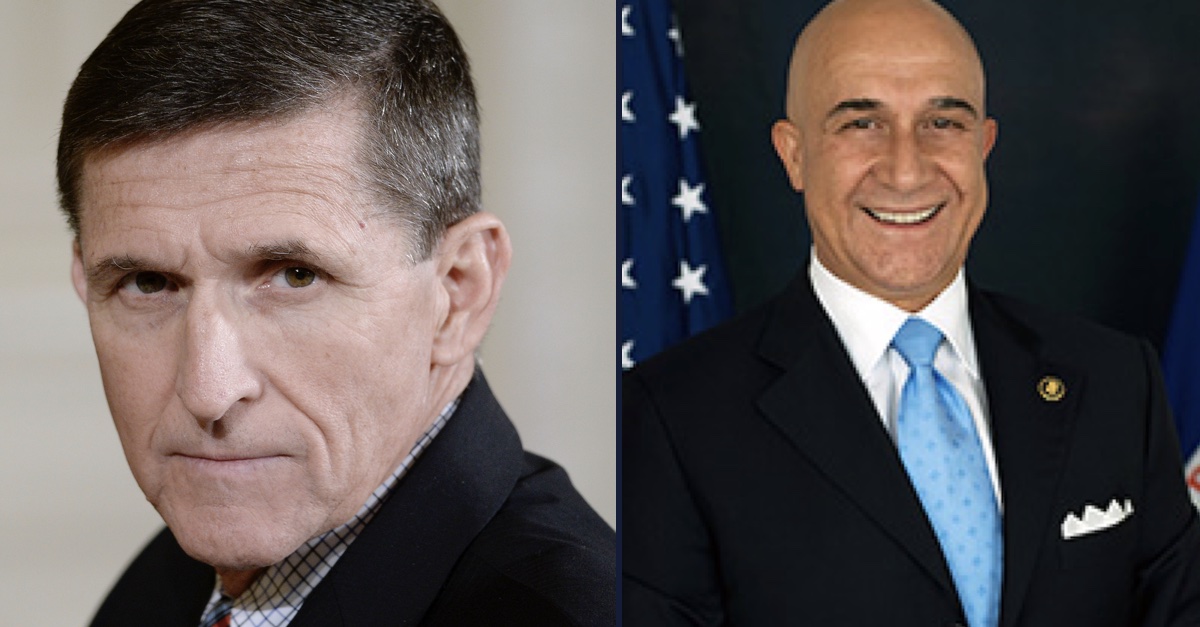
Michael Flynn (Sipa via AP Images), Bijan Rafiekian (Export-Import Bank of the United States)
The Department of Justice quietly abandoned the prosecution of a former business associate of pardoned ex-National Security Advisor Michael Flynn, a case which cropped up during special counsel Robert Mueller’s Russia investigation.
In late 2018, the DOJ indicted Bijan Rafiekian (a.k.a., Bijan Kian), now 71, and Turkish-Dutch national Kamil Ekim Alptekin, charging them with conspiracy and illegally acting in the U.S. as agents of the Turkish government.
Rafiekian and Alptekin were accused of being involved “in a conspiracy to covertly influence U.S. politicians and public opinion against a Turkish citizen living in the United States whose extradition had been requested by the Government of Turkey.” That Turkish citizen was imam Fethullah Gulen, who was accused by Turkish President Recep Tayyip Erdogan of orchestrating a failed coup.
Rafiekian, once nominated by President George W. Bush to the board of directors at the Export-Import Bank of the United States, is a U.S. citizen who served as the vice chairman, director, secretary and treasurer of the Flynn Intel Group, an organization he co-founded and co-owned, according to a 2019 memorandum opinion.
Here’s how the DOJ at the time described the “plot” to recruit Flynn to the alleged smear campaign known as “Project Truth”:
The plot included using a company founded by Rafiekian and a person referred to as “Person A” [Flynn] in the indictment. The company, referred to as “Company A” in the indictment, provided services based upon Person A’s national security expertise.
The indictment charges that the purpose of the conspiracy was to use Company A to delegitimize the Turkish citizen in the eyes of the American public and United States politicians, with the goal of obtaining [Gulen’s] extradition, which was meeting resistance at the U.S. Department of Justice. At the same time, the conspirators sought to conceal that the Government of Turkey was directing the work. However, not only did Turkish cabinet-level officials approve the budget for the project, but Alptekin provided the Turkish officials updates on the work, and relayed their directions on the work to Rafiekian, Person A, and others at Company A.
Although Rafiekian went on to be convicted by a jury in the Eastern District of Virginia over the summer of 2019, Senior U.S. District Judge Anthony Trenga, a Bush appointee, set aside the verdict, finding the evidence “insufficient as a matter of law.”
At the same time, Judge Trenga granted Rafiekian a new trial before an eventual DOJ appeal to the U.S. Court of Appeals for the Fourth Circuit. In March 2021, the Fourth Circuit reinstated the convictions.
Read Related Also: Sophie Turner cracks a relaxed smile and flashes HUGE barbed wire temporary back tattoo as she films drama Joan in Spain amid shock divorce from Joe Jonas
“Under our deferential standard of review, we must uphold the jury’s verdict if ‘any trier of fact could have found that the evidence either direct, circumstantial or a combination of both — along with any reasonable inference[s]’ established the essential elements of the crime beyond a reasonable doubt,” the three-judge panel ruled. “Based on the evidence presented, a rational juror could conclude that Project Truth was synonymous with Project Confidence; that the Turkish government was, in fact, behind the project; that, through Alptekin, Turkey communicated both general and specific instructions; and that Rafiekian hewed to those directions over the life of the engagement—all without notifying the Attorney General. That is enough to make out a § 951 violation.”
The following month, the court declined to re-hear the case en banc.
Still, DOJ had to prepare for a new trial.
As recently as July 10, 2023, Judge Trenga ordered up a status conference to “set a trial date should the United States elect to proceed with a new trial.”
By Aug. 23, the judge issued an order “with respect to Jury Trial instructions.”
On Sept. 11, however, the DOJ surrendered in the case for good, filing a motion to dismiss the charges “with prejudice.” Prosecutors declared that the Fourth Circuit’s reasoning in the case led them to the conclusion that prosecuting Rafiekian is “not in the public interest” any longer:
The United States respectfully moves pursuant to Federal Rule of Criminal Procedure 48(a), to dismiss Counts One and Two of the indictment in this case with prejudice. Defendant Bijan Rafiekian is only charged in Counts One and Two of the indictment. After carefully considering the Fourth Circuit’s recent decision in this case and the principles of federal prosecution, the United States believes it is not in the public interest to pursue the case against defendant Bijan Rafiekian further. Defendant Rafiekian does not oppose this motion.
The government attached a proposed order for the judge to sign.
[Photo of Rafiekian from the Export-Import Bank of the United States]
Have a tip we should know? [email protected]






